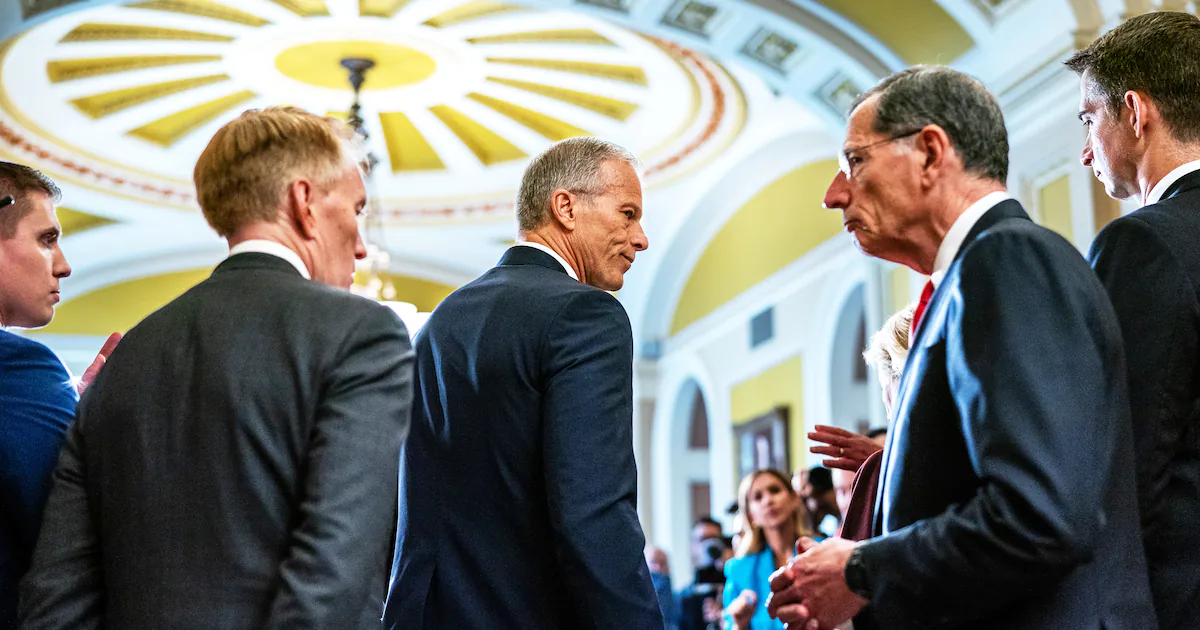
Sen. Lindsey Graham (R-South Carolina) offered a fairly standard idea for getting Congress out of a federal shutdown: Create an ad hoc group of senators to resolve the battle over whether to include Affordable Care Act subsidies in any bill that would keep the government running.
“They need to actually do a group, put together a working group, to fix that. Find a solution that we can all live with,” Graham told reporters Monday evening, about 30 hours before federal agencies ran out of spending authority.
However, despite his status as a veteran of past Senate “gangs” that have resolved disputes, Graham said he wanted no part of this working group. No other Senate veterans of dealmaking groups have gotten together during this shutdown fight to hash things out, either.
Instead, Senate Majority Leader John Thune (R-South Dakota) and Minority Leader Charles E. Schumer (D-New York) have been given fairly broad leeway to carry out their strategies of plunging the federal government into a shutdown and then trying to win the resulting public-relations battle.
One reason that the leaders have been given such latitude, and that there’s been no momentum toward an ad hoc gang of problem solvers, is that very few senators feel the political pressure that usually comes with calamitous events like a federal agency shutdown.
[Furloughs, layoffs and more: Here are some effects of a shutdown if Congress and Trump don’t reach a deal]
Most sit in safe seats, many with reelection campaigns a distant concern. Ahead of the 2026 midterm elections, only three senators – Susan Collins (R-Maine), Jon Husted (R-Ohio) and Jon Ossoff (D-Georgia) – are rated by independent handicappers as facing very tough reelection battles.
A few other seats are considered competitive next year, but those are held by senators who’ve decided to retire and therefore do not have the same political pressure to respond if the public breaks clearly against either party.
None of the senators sitting in battleground states such as Arizona, Nevada, Pennsylvania and Wisconsin are up for reelection until 2028 or 2030, at which point the 2025 shutdown is unlikely to be remembered by even the most studious of voters.
The three senators in tough seats have dug in behind their leadership, so far. Ossoff voted against advancing a government funding bill back in March. Schumer led a group of 10 Democrats who joined with Republicans to avert a shutdown at that time, a choice Schumer faced a great deal of criticism for among Democratic voters.
Ossoff has continued his opposition in recent weeks, voting twice against the latest GOP bill, including Tuesday with barely five hours to spare before the shutdown. He has accused Republicans of blocking efforts to “prevent massive increases to Georgians’ health insurance premiums next year.”
Husted, appointed to his seat to replace Vice President JD Vance, appears more focused on appealing to his right flank than on bipartisan dealmaking, to ensure he escapes the midterms without a primary challenge. On Tuesday he accused Democrats of seeking “taxpayer-funded health care for illegal aliens.”
And Collins, who has hosted plenty of bipartisan gangs in her office over 29 years in the Senate, pointed the blame squarely at Schumer on Tuesday for pushing Congress to the shutdown brink after the liberal base erupted at him in mid-March.
“I honestly think that the biggest problem we have is that Chuck Schumer got very burned when in March he agreed to a continuing resolution. He doesn’t want to go through that again,” she said.
Back in early 2018, when Schumer and Democrats forced a brief shutdown over demands for protections for young immigrants brought here illegally by relatives, Collins played peacemaker.
Her office became “Switzerland,” as Graham called it, neutral ground for a bipartisan group that started with about a dozen senators and grew to 25 a few days later. As a gift, Sen. Heidi Heitkamp (D-North Dakota) gave Collins a “talking stick,” which Collins has described as an African artifact used to determine which senator was allowed to speak while everyone else had to shut up.
“Everybody’s voice got heard,” Collins said on CNN, after the group helped the government reopen after less than three days.
Many of those same senators would end up paving the way to a late-2020 deal for nearly $1 trillion in pandemic relief, as well as a massive infrastructure law in 2021, a modest gun violence bill in 2022 and an election law that responded to the January 2021 insurrection attempt.
However, the Senate has changed rapidly in the last eight years.
Only about half of the two dozen senators involved in the early-2018 deal remain in office.
Several from the traditional conservative Republican wing, including Tennessee’s Lamar Alexander and Bob Corker as well as Arizona’s Jeff Flake, retired rather than seeking reelection in President Donald Trump’s GOP. A half-dozen of those Democrats, including Heitkamp, got chased from office in states that voted heavily for Trump and no longer could support centrist Democrats.
Rather than leading a centrist bloc trying to avert a shutdown, retired senator Joe Manchin III (West Virginia) is on a tour promoting his book, “Dead Center,” explaining why he left the Democratic Party and why he wants to start a third party by 2028.
Rather than trying to find like-minded Republicans to compromise with Democrats on the health care subsidies, Flake spent Tuesday morning lashing out at his old GOP colleagues for not standing up to Trump’s posting of a fake video featuring racist memes involving Schumer and House Minority Leader Hakeem Jeffries (D-New York).
“C’mon fellow Republicans, we’re better than this,” he wrote on social media.
The House has sometimes played a role in getting the government out of shutdowns, but Democrats there view any resolution to this standoff as coming from the Senate. Republicans can pass legislation in the House without any Democratic help, but the same isn’t true in the Senate. And Speaker Mike Johnson (R-Louisiana) still hasn’t called the House back into session since it passed a GOP-drafted funding outline.
“So, the Senate is where it’s going to happen. It’s very clear,” Rep. Don Beyer (D-Virginia) said Tuesday, noting that the upper chamber’s filibuster rules mean at least seven Democrats are needed for 60 votes. “Can they find seven Democratic senators, and what’s the cost for getting those seven?”
Some veteran centrists want to start talks, but for now they are deferring to Thune and Schumer.
“I think there are still a majority of members on both sides of the aisle who could come together, and hopefully that will happen,” Sen. Jean Shaheen (D-New Hampshire) said Tuesday.
There was no real way to avoid at least a short-term shutdown, Shaheen said. “The problem is nobody’s negotiating.”
Collins could eventually be coaxed into hosting a working group, but she’s not sure when.
“Maybe I should bring out the talking stick once again,” she said.
The stick is tucked away in her office, in a closet.
Graham doesn’t expect to take any role in settling matters. In the last few years, his presence in Senate gangs usually ended in failure, with one colleague dubbing him a “chaos monster” for his role in torpedoing a border security negotiation in early 2024.
He nominated colleagues like Sens. Bill Cassidy (R-Louisiana) and Mike Rounds (R-South Dakota) to work in an ad hoc group.
“I’m into blowing up stuff, they can fix it,” he said.



